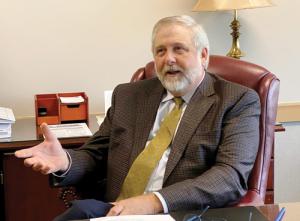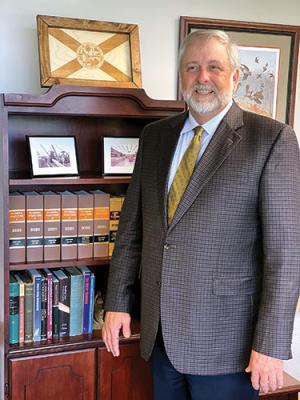State Commissions
Gary Clark is a Commissioner for the Florida Public Service Commission.
The Florida Commissioners these days are busy, grappling with the tough subjects of utility ratemaking in the public interest, but also population growth and ensuring all those residents, old and new, have reliable utility services. Enjoy these conversations with Florida Chair Andrew Fay, and Commissioners Art Graham, Gary Clark, Mike LaRosa, and Gabriella Passidomo.

PUF's Lori Burkhart: How did your background lead you here to the Commission?
Commissioner Gary Clark: I probably have one of the more unique backgrounds of Commissioners. I started out in the electric utility business and served at an electric co-op for about twenty-eight years.
I worked in a local electric co-op close to my hometown and was given an opportunity to take an early retirement, so I did. I went home and planned to enjoy retirement, but that lasted about six weeks. I found out I couldn't do that.
A friend of mine at the time was secretary of the Department of Environmental Protection. He called and asked if I would be interested in coming to work.
 Commissioner Gary Clark in his office.
Commissioner Gary Clark in his office.
I was hesitant to accept. At the time it wasn't where I saw my career going.
But he convinced me to come to work for the DEP, where I had an opportunity to run the state lands and state park system for Florida, which was one of the most unique jobs. I oversaw one hundred seventy-five state parks, the most diverse and largest park system in the country.
I worked for Secretary Steverson in the DEP for four years before a seat on the Commission came open, and friends of mine convinced me to apply. They suggested my experience would be a fit for the Commission because of my experience and the fact I'd been out of the electric business for a little while.
I made the application and was fortunate to be appointed. I've also been in private business for a number of years, so I brought that to the Commission. My family has owned and operated a chain of Subway sandwich shops for the last twenty-five years.
My wife runs our business, but I've been on every side of this equation now. I've been in the utility business making rates, owning eleven stores, and some rental property, so we pay a lot of rates.
We pay a lot of utility bills, so I understand the direct impact that any change made here has on consumers. I see it every day. Having the opportunity to be on the regulatory side, getting to look at issues from all three of these perspectives, a ratemaker, a ratepayer, and a regulator.
PUF: What's your typical day like at the Commission and how do you prioritize your busy schedule?
Commissioner Gary Clark: We have a great team here. Let me emphasize that. The Staff at this Commission are some of the most qualified and trained professionals I've ever worked with. They do a tremendous job of keeping this running on a daily basis. They make our job much easier.
Most of the day as a Commissioner is spent reading. I've worn out pairs of glasses. I didn't think you could wear glasses out reading. That's what most of our time is spent doing because of the decision-making process.
We spend the bulk of our time going through data and information and doing research and homework and trying to get all of the background information together. That's going to help us make the best decision when we finally get to those decision-making points.
The biggest role is played by the Chairman at our Commission. He has more of an administrative function. I just came off of a two-year term. In that role, of course, the administrative responsibilities step up in terms of making certain that the dockets continue to flow.
PUF: What are the biggest issues facing you as regulators in Florida right now?
Commissioner Gary Clark: The biggest challenge we're facing these days are the changing dynamics of the customer base. Utilities have this predisposed idea of how things have been operating for the last hundred years, and the paradigm shift is on the consumer side.
We are seeing an expectation coming from consumers today that I don't think we've ever seen before. I've watched this over the last thirty years. It's been interesting even in my career.
I remember early in my career; we were going through some old boxes in storage. We were seeing what we could throw away and what we needed to keep. I came across a postcard from December 6th, 1954.
The postcard said, Dear REA, lights have been out for a couple days. Next time you have someone in the area, please send them by. Can you imagine that today? We can't go twenty-four hours without having our power restored nowadays.
But it's even evolving beyond that. I go back through my career and see how the customer expectations were changing when we had a hurricane thirty years ago. You had five days before people started getting angry about the power being out.
Toward the end of my time working at the electric cooperative, you had three days. Now you only have twenty-four hours. That's the new expectation, is we're not going to have an outage that lasts longer than twenty-four hours.
Balancing the utility demands and needs with those kind of customer demands is becoming increasingly complex. Where is the cost break point? Where's the break-even point here between the amount of money you're going to spend as an investment to be able to ensure that reliability is to customer expectations?
That is the real challenge I see and we're blending that with new customer expectations when it comes to renewable energy and making sure we're meeting their desires with something that has the reliability they've come to count on.
Sometimes the best you can do is to put systems in place that are protections for customers, even when everybody doesn't understand and see why you're doing what you're doing right now. In the long-term, having a realistic expectation of what the results are going to be may yield better results.
PUF: There is an important component of keeping the economy strong by the Florida Commission. How do you see that relationship?
Commissioner Gary Clark: The utility industry in Florida plays a huge role in the economy. Number one, you're trying to make sure we have a reliable power source. The reliability issue is something that businesses are making decisions based off of.
Part of my utility experience was working in economic development. As a utility company, we were recruiting business and industry to the State of Florida, and there are several tools that we were using.
We were using our rates and our rate structure as a recruiting tool. Florida still has below national average prices. We have a bargain here when it comes to electricity. Most of our utilities are below the national average in pricing, but we also have great reliability.
You had to convince businesses that were seeking to relocate here that Florida wasn't just a tourist state. We're not just about tourism. We're about business and making sure that we have the resources those businesses need.
It's not just electricity. It came down to the availability of our gas systems as well. It comes down to availability of water resources, and how we're handling our sewer systems, and that's an important part of it.
Florida suffers from a negative image when it came to the hurricanes and how we were impacted. You're not going to recruit the large data centers. They're not going to locate in Florida because of potential outage issues.
So, you had to start to reinforce the fact that we had reliability, backups, redundant systems, security of the grid, and reliability of not just the distribution system, but the transmission system as well.
Folks saw Florida was doing a good job in enhancing and improving our reliability. Hats off to our legislature. They took that on as one of their key initiatives, making sure we had a storm protection plan mechanism to harden our grid to make sure we were offering more and additional reliability to our consumers.
PUF: When you talk about hurricanes and resilience, what do you think about Florida's energy future? Are you optimistic about it, and do you have any concerns?
Commissioner Gary Clark: I'm very optimistic about our energy future. We have a good supply system in place right now. We do have to be concerned about diversity in the future. We have a strong reliance on natural gas for generation.
We're in a situation where the pressures have been put on fossil fuel generation. We are trying to, again, continue to balance that demand and that cost associated with fossil fuel production, and looking at a diverse mix that includes some solar and wind power.
We still have to work on our storage systems. If we're going to see renewables play a key role in Florida's energy future, we have to solve the storage issue.
That's going to be a bit longer-term play than folks expect. Sure, we'd love to all see battery storage up to speed and up to par in two years. It's probably going to take longer than that to meet the diverse needs of Florida consumers.
Florida is a strange state when it comes to weather and temperature. We typically are an air conditioning state, but when we become a heating state, we are a large heating state and we're dependent on electricity for the heating of most of our homes.
We have this unusual high demand occasionally during the wintertime. We have to be prepared for it. That causes some difficulties in load forecasting or long-range planning when it comes to power plant production and power plant planning. It's a unique aspect that we have to be prepared for those winter peaks, but most of our usage occurs during the summertime.
PUF: What do you hope to accomplish in your role here as a Commissioner in Florida?
Commissioner Gary Clark: The most important thing for me is to make sure the role that I am playing at this Commission is one that seeks to make sure customers' interests are protected and the utility companies' needs are met at the same time.
Calculating and figuring where the balance is between utility needs and customer demands, that's the key role we play here. That's one of the things I want to be remembered for when I leave here, is that we did a good job of balancing those needs and those demands and making sure we still had fair prices and reliable energy and water.
Florida PSC Conversations:


